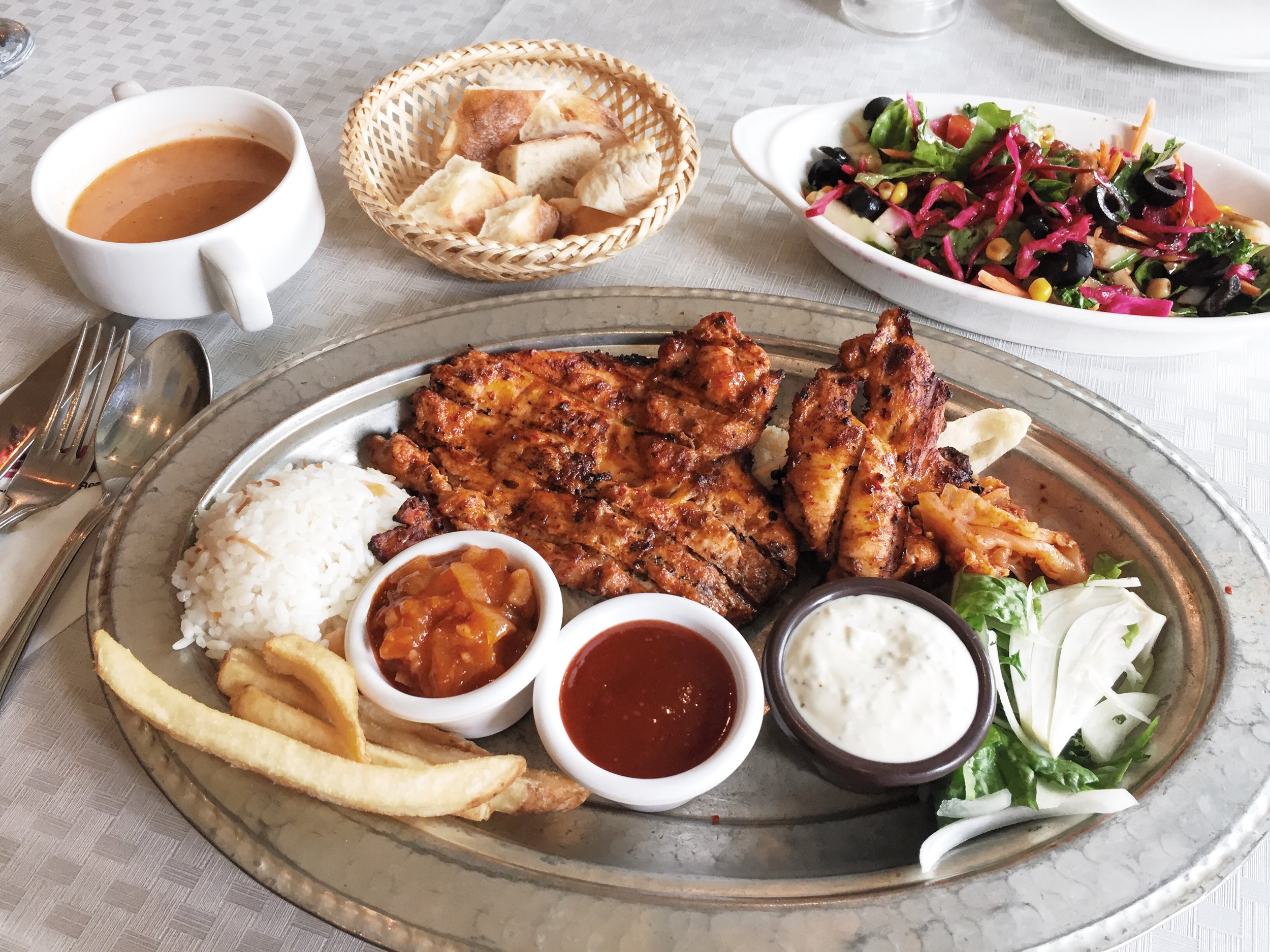FEATURED PHRASES:
*the following phrases are formal
애완동물 키워요?
Aewandongmool kiwoyo?
Do you raise a pet?
고양이 키워요?
Goyangee kiwoyo?
Do you raise a cat?
개 키워요?
Gae kiwoyo?
Do you raise a dog?
Just fill in the blank with a type of pet.
_______ 키워요?
_______ kiwoyo?
Do you raise _______?
One way to answer the previous question is to turn it into a statement. Instead of raising YO up, pronounce it downwards.
고양이 키워요.
Goyangee kiwoyo.
I raise a cat.
토끼 키워요.
Tokki kiwoyo.
I raise a rabbit.
뱀 키워요.
Bem kiwoyo.
I raise a snake.
What if you have more than one pet?
개 두 마리 키워요.
Gae doo mari kiwoyo.
I raise two dogs.
토끼 세 마리 키워요.
Tokki sae mari kiwoyo.
I raise three rabbits.
뱀 네 마리 키워요.
Bem nae mari kiwoyo.
I raise four snakes.
고양이 서른 마리 키워요.
Goyangee suhreun mari kiwoyo.
I raise thirty cats.
Fill in the blanks with a pet and conjugated native Korean number.
PET + NUMBER 마리 키워요.
PET + NUMBER mari kiwoyo.
I raise NUMBER + PET.
If you want to add different types of pets, then add HAGO between the nouns. For example:
PET + NUMBER 하고 PET + NUMBER 마리 키워요.
PET + NUMBER hago PET + NUMBER mari kiwoyo.
I raise NUMBER + PET and NUMBER + PET.
토끼 한 마리 하고 뱀 한 마리 키워요.
Tokki han mari hago bem han mari kiwoyo.
I raise one rabbit and one snake.
개 한 마리 하고 고양이 두 마리 키워요.
Gae han mari hago goyangee doo mari kiwoyo.
I raise one dog and two cats.
햄스터 두 마리 하고 쥐 두 마리 키워요.
Hemseuyuh doo mari hago jwi doo mari kiwoyo.
I raise two hamsters and two mice.
If you don’t have any pets, then say this:
애완동물 안 키워요.
Aewandongmool ahn kiwoyo.
I don’t raise any pets.
How old is their pet? Ask away.
개 몇살이에요?
Gae myutsaleyeyo?
How old is your dog?
고양이 몇살이에요?
Goyangee myutsaleyeyo?
How old is your cat?
햄스터 몇살이에요?
Hemseutuh myutsaleyeyo?
How old is your hamster?
Fill in the blank with an animal.
_______ 몇살이에요?
_______ myutsaleaeyo?
How old is your _______?
To answer, take out MYUT and place a conjugated Native Korean number in front of 살이에요.
한 살이에요.
Han saleeyeyo.
It’s one year old.
두 살이에요.
Doo saleeyeyo.
It’s two years old.
세 살이에요.
Sae saleeyeyo.
It’s three years old.
What if your pet is a couple months old?
일 개월 됐어요.
Eel gaewol dwaessuhyo.
It’s one month old.
육 개월 됐어요.
Yuk gaewol dwaessuhyo.
It’s six months old.
구 개월 됐어요.
Goo gaewol dwaessuhyo.
It’s nine months old.
Use the Sino-Korean numbers for this phrase, NOT Native Korean numbers.
_______ 개월 됐어요.
_______ gaewol dwaessuhyo.
It’s _______ months old.
이름이 어떻게 돼요?
Eereumee uhdduhgae dwaeyo?
What is its name?
직접 훈련 시키셨나요?
Jikjuhb hoonlyun shikisyeotnayo?
Did you train it yourself?
재주있어요? 보여주세요.
Jaeju issuhyo? Boyuhjuseyo.
Does it know any tricks? Please show me.
고양이하고 얘기하세요?
Goyangeehago yegihaseyo?
Do you talk to your cat?
You can replace CAT/GOYANGI with any other animal.
전 제 고양이하고 얘기 많이해요.
Jeon jae goyangeehago yegi maneehaeyo.
I talk to my cat a lot.
전 결혼 안하고 고양이 열 마리랑 함께 살꺼예요.
Jeon gyeolhon ahnhago goyangee yeol marirang hangge salgguhyeyo.
Instead of getting married, I’m going to live with ten cats.
Here also you can replace CAT/GOYANGI with another animal.
어느 애완동물가게 가세요?
Uhneu aewandongmoolgagae gaseyo?
Which pet store do you go to?
Maybe you want to find out which hospital to take your beloved kitty to?
어느 수의사한테 가세요?
Uhneu soouisahanteh gaseyo?
Which vet do you go to?
Let’s say you’re talking to someone who doesn’t have a pet. Ask them the following questions:
애완동물 키워본 적 있어요?
Aewandongmool kiwobon jeok issuhyo?
Have you ever had a pet?
PRONOUNCE SLOW.
애완동물 키우고 싶으세요?
Aewandongmool kioogo shipeuseyo?
Would you like a pet?
Now for some potential replies.
네, 근데 제 집이 너무 작아요.
Ne, geundae jae jipee nuhmoo jakayo.
Yes, but my home is too small.
귀엽지만 돈이 너무 많이 들어가요.
Gwiyeopjiman donee nuhmoo manee deuluhgayo.
They’re cute, but they cost too much.
개 사료가 제 밥 값보다 더 비싸요.
Gae saryoga jae bap gapboda duh beessayo.
Dog food is more expensive than my food.
전 저 살기도 바빠요.
Jeon juh salgido babbayo.
I’m too busy to even take care of myself!
For the full list of pets in Korean and for pronunciation, watch KWOW episode 29 (below).
이름이 어떻게 돼요?
Eereumee uhdduhgae dwaeyo?
What is its name?
직접 훈련 시키셨나요?
Jikjuhb hoonlyun shikisyeotnayo?
Did you train it yourself?
재주있어요? 보여주세요.
Jaeju issuhyo? Boyuhjuseyo.
Does it know any tricks? Please show me.
고양이하고 얘기하세요?
Goyangeehago yegihaseyo?
Do you talk to your cat?
You can replace CAT/GOYANGI with any other animal.
전 제 고양이하고 얘기 많이해요.
Jeon jae goyangeehago yegi maneehaeyo.
I talk to my cat a lot.
전 결혼 안하고 고양이 열 마리랑 함께 살꺼예요.
Jeon gyeolhon ahnhago goyangee yeol marirang hangge salgguhyeyo.
Instead of getting married, I’m going to live with ten cats.
Here also you can replace CAT/GOYANGI with another animal.
어느 애완동물가게 가세요?
Uhneu aewandongmoolgagae gaseyo?
Which pet store do you go to?
Maybe you want to find out which hospital to take your beloved kitty to?
어느 수의사한테 가세요?
Uhneu soouisahanteh gaseyo?
Which vet do you go to?
Let’s say you’re talking to someone who doesn’t have a pet. Ask them the following questions:
애완동물 키워본 적 있어요?
Aewandongmool kiwobon jeok issuhyo?
Have you ever had a pet?
애완동물 키우고 싶으세요?
Aewandongmool kioogo shipeuseyo?
Would you like a pet?
Now for some potential replies.
네, 근데 제 집이 너무 작아요.
Ne, geundae jae jipee nuhmoo jakayo.
Yes, but my home is too small.
귀엽지만 돈이 너무 많이 들어가요.
Gwiyeopjiman donee nuhmoo manee deuluhgayo.
They’re cute, but they cost too much.
개 사료가 제 밥 값보다 더 비싸요.
Gae saryoga jae bap gapboda duh beessayo.
Dog food is more expensive than my food.
전 저 살기도 바빠요.
Jeon juh salgido babbayo.
I’m too busy to even take care of myself!




























